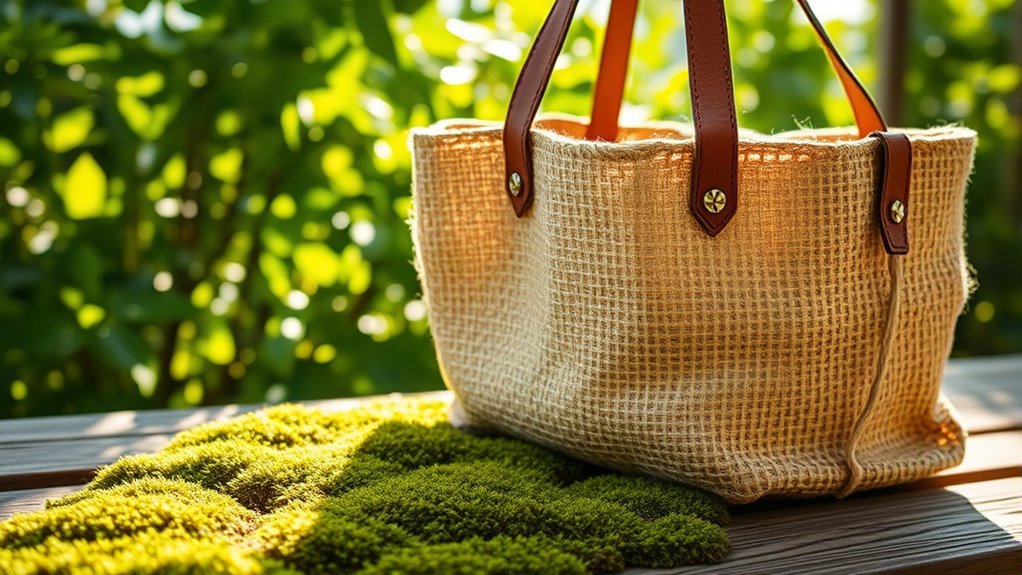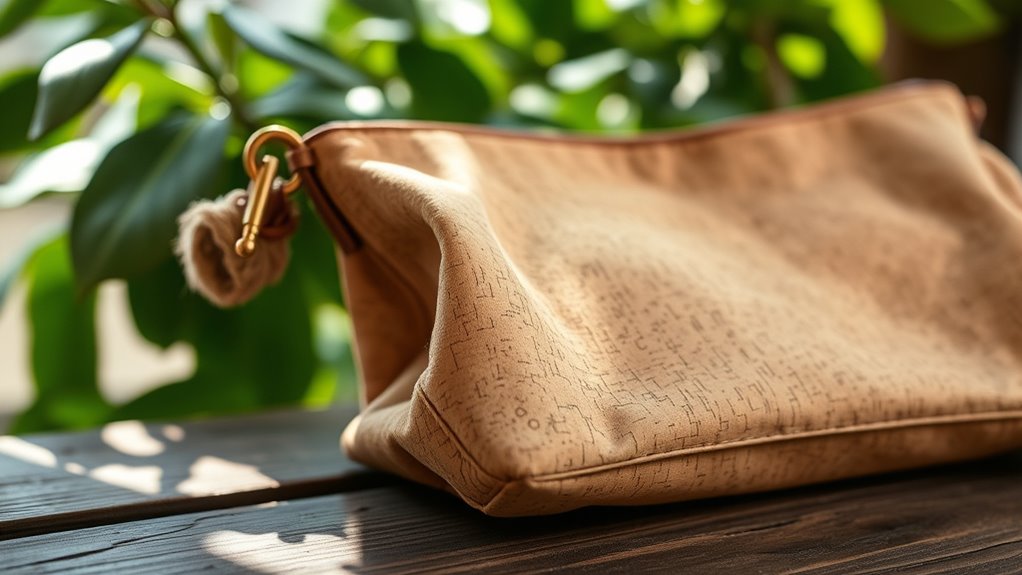To choose an eco-friendly handbag, focus on sustainable materials like organic cotton, cork, or recycled plastics, and look for brands using plant-based leathers such as Piñatex or mushroom leather. Guarantee the product is ethically produced with fair wages and safe conditions, and check for certifications like Fair Trade or B Corp. Prioritize durable designs that last longer and reduce waste. If you want to discover more tips, there’s plenty to explore on making responsible choices.
Key Takeaways
- Choose handbags made from sustainable materials like organic cotton, cork, recycled plastics, or plant-based leathers.
- Verify ethical production practices ensuring fair wages, safe conditions, and transparent supply chains.
- Prioritize durable, versatile designs that last longer and reduce the need for frequent replacements.
- Look for certifications such as Fair Trade, GOTS, or B Corp to confirm eco-friendly and ethical standards.
- Consider the overall lifecycle and environmental impact, supporting brands committed to responsible sourcing and transparency.

Eco-friendly handbags are gaining popularity as more people seek stylish accessories that don’t harm the planet. When shopping for these bags, one of the most important factors to consider is the use of sustainable materials. These materials are sourced in ways that minimize environmental impact, often produced with renewable resources or through processes that reduce waste and pollution. Look for bags made from organic cotton, cork, recycled plastics, or plant-based leathers like Piñatex or mushroom leather. These options not only lower your carbon footprint but also help conserve natural resources and reduce landfill waste. Choosing sustainable materials means you’re making a conscious effort to support eco-friendly practices and reduce reliance on traditional leather or synthetic fabrics that can take decades to decompose or release harmful chemicals during production.
Eco-friendly handbags use sustainable materials like organic cotton, cork, and recycled plastics to reduce environmental impact.
Equally important is the emphasis on ethical production. An eco-friendly handbag isn’t just about the materials; it’s also about how it’s made. Ethical production ensures that workers involved in manufacturing are paid fair wages, work in safe environments, and aren’t exploited. Brands committed to ethical production often provide transparency about their supply chains, allowing you to trace the journey of your handbag from raw material to finished product. This transparency demonstrates a brand’s dedication to social responsibility and reduces the likelihood of supporting exploitative labor practices. When you choose a handbag from a company that prioritizes ethical production, you’re endorsing fair labor standards and helping promote better working conditions worldwide.
In addition to sustainable materials and ethical production, it’s wise to consider the durability and versatility of the handbag. Eco-friendly bags are often designed to last longer, reducing the need for frequent replacements. This longevity aligns with sustainable principles by minimizing waste and conserving resources. Opt for timeless designs that match your style and can be worn across different seasons and occasions. Proper care and maintenance will extend the life of your handbag, making it a truly eco-conscious choice. Incorporating sound design principles like thoughtful layering and material manipulation can also enhance the durability and aesthetic appeal of your bag.
Finally, don’t forget to check for certifications or labels that verify a brand’s eco-friendly claims, such as Fair Trade, GOTS, or B Corp certifications. These labels provide added assurance that the handbag is produced following strict environmental and social standards. By paying attention to these aspects—sustainable materials, ethical production, durability, and certifications—you can confidently select a handbag that not only complements your style but also aligns with your values of sustainability and social responsibility.
Frequently Asked Questions
How Do Eco-Friendly Handbags Compare in Durability to Conventional Ones?
Eco-friendly handbags often match or even surpass conventional bags in durability. Natural fibers like cork or hemp tend to be sturdy, while synthetic eco-friendly options such as recycled plastics can resist wear and tear well. However, chemical treatments used on some eco-friendly materials may weaken fibers over time, so it is crucial to check these treatments’ effects. Overall, with proper care, eco-friendly handbags can be just as durable as conventional ones.
Are Eco-Friendly Handbags Suitable for All Weather Conditions?
Imagine your eco-friendly handbag standing strong through a sudden downpour or chilly winter walk. Yes, these bags are suitable for all weather conditions because many feature water resistance, protecting your belongings. Their seasonal versatility means you can carry them year-round, whether summer or winter. Just choose a style with durable, water-resistant materials, and you’ll enjoy reliable performance no matter the forecast.
Can Eco-Friendly Handbags Be Recycled or Composted After Use?
Eco-friendly handbags can often be recycled, depending on their materials. Check for biodegradability options like natural fibers or plant-based plastics, which break down more easily. Recycling processes vary; some handbags can be sent to specialized facilities that process eco-friendly materials, while composting is usually suitable only for biodegradable bags. Always verify manufacturer instructions to guarantee proper disposal and to minimize environmental impact.
What Certifications Should I Look for in Eco-Friendly Handbags?
When choosing eco-friendly handbags, look for certifications like Fair Trade or Global Organic Textile Standard (GOTS). For example, imagine buying a bag with Fair Trade certification, ensuring sustainable sourcing and ethical manufacturing. These certifications guarantee that the materials are responsibly produced, supporting fair labor practices and environmental health. They help you make a conscious choice, knowing your handbag aligns with sustainability and ethical standards.
How Do Eco-Friendly Handbags Impact Overall Environmental Sustainability?
Eco-friendly handbags positively impact environmental sustainability by reducing your carbon footprint and supporting biodiversity conservation. When you choose sustainable materials, you lower greenhouse gas emissions linked to production and transportation. Additionally, these handbags often come from sources that protect ecosystems and promote responsible land use. By opting for eco-friendly options, you help conserve biodiversity and contribute to a healthier planet for future generations.
Conclusion
As you choose your eco-friendly handbag, think of it as planting a seed for a greener future. Every conscious choice you make adds a splash of color to the world’s canvas, turning your style into a vibrant act of kindness. With each eco-friendly bag you carry, you’re weaving a tapestry of sustainability that shines brighter with every step. So go ahead—let your handbag be a beacon, guiding others toward a more beautiful, sustainable tomorrow.









